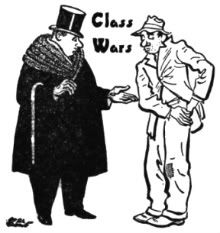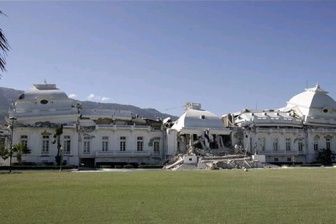Pages: << 1 ... 1121 1122 1123 1124 1125 1126 1127 1128 1129 1130 1131 ... 1278 >>
Why do 'Tea Baggers' and Republicans make such good l'il Nazis?
by Len Hart, The Existentialist Cowboy

Research repeatedly confirms that Republicans are naturally inclined to exhibit authoritarian personality traits. The research leading to this conclusion is extensive. It was Carl Jung, in his 'The Undiscovered Self' who said that about thirty percent of every population was certifiably psychopathic. Dr. Gustav Gilbert, who had been tasked with keeping Nazi war criminals alive until they could be hanged, concluded that his 'clients' had an defining characteristic in common: all, he said, 'lacked empathy'. Later, Hannah Arendt, founder of the New School for Sociological Studies in New York, coined a phrase to describe what she had observed of "Adolph Eichmann at this trial: 'the banality of evil'.
It's the "New Haiti!"
The appointment of former presidents Bill Clinton and George W. Bush as key players in Haitian relief should cause the people of Haiti grave concern, if they weren't otherwise preoccupied with survival. These former presidents' records as pro-life advocates on the international scene is tarnished by real world outcomes.
During his eight years as president, Clinton was responsible for sanctions on Iraq that resulted in the deaths of 170,000 children under five. Former President George W. Bush exceeded that death toll by invading Iraq. That caused civil chaos and conflict among Iraqis leading to the deaths of over one million citizens in that tragic nation. When you see these two coming, their record speaks for itself. (Image)
Political Earthquake Rocks Massachusetts
by Stephen Lendman

For the moment, millions of Haitians don't matter. For Washington and the West, they never did and don't now. It's pretense, a topic a forthcoming article will explore.
Today, however, the Massachusetts political earthquake takes precedence, and headlines explain it.
From the Boston Globe:
"Big win for Brown....Voter anger caught fire in final days." How can it be, asks the Globe, that "an obscure state senator with an unremarkable record" (became) a household name across the country by the end of the abbreviated campaign."
Israel starving Gaza and help Haiti? Is it compassion or propaganda to clean up the brutal face of Zionism?
Salim Nazzal
The tragedy of Haiti, and the suffering of the Haitian people, has stirred an outpouring of compassion around the world. This is what humans should expect from each other following a catastrophe of this proportion.
Since I consider myself a person committed to the question of the human dignity, I was relieved to see the quick response from the rescue and the medical teams which travelled long distances and worked tirelessly to save the lives of those buried under the ruins.
Recovering a Lost America
by Len Hart, The Existentialist Cowboy
Europe is a life changing experience for many Americans, an important part of the 'American Experience'. The most obvious examples are famous writers from Thomas Wolfe to Ernest Hemingway'. They enriched American literature with their often personal experiences of Europe. Artists like James Whistler and John Singer Sargent were at once fresh eyes in Europe and glimpses of rich European culture for Americans.
Obama Needs a Major Course Correction to Excite Voters
By Kevin Zeese

First Step - Re-make the White House to get on the right side of corporate elites vs. the people
Second - Make challenging corporate power the 2010 election year issue
The Democrats are on the wrong side of a battle between big business elites and voters. If they stay on the side of the elites Massachusetts will not be the final defeat they suffer.
President Obama needs a rapid and major first-year course correction. He needs to learn from the Massachusetts senate race and two gubernatorial defeats in New Jersey and Virginia last year. The lessons: stop taking progressive voters for granted and make challenging corporate cronyism a top priority.
THE WORLD WILL NOT END IN 2012
Carlos Barrios

CARLOS BARRIOS was born into a Spanish family on El Altiplano, the highlands of Guatemala. His home was in Huehuetenango, also the dwelling place of the Maya Mam tribe. With other Maya and other indigenous tradition keepers, the Mam carry part of the old ways on Turtle Island (North America). They are keepers of time, authorities on remarkable calendars that are ancient, elegant and relevant.
Mr. Barrios is a historian, an anthropologist and investigator. After studying with traditional elders for 25 years since the age of 19, he has also became a Mayan Ajq'ij, a ceremonial priest and spiritual guide, Eagle Clan.
Unsurprising Poll Results from Massachusetts: Voters Think Obama Sides With the Banks

By Numerian
An interesting observation was made today by the pollster for Martha Coakley, the hapless Democratic candidate for the Massachusetts senate seat held almost forever by Ted Kennedy. It appears polls are showing that the voters, especially independents who would normally vote Democratic in a liberal blue state like Massachusetts, have instead run to support the Republican candidate as the agent of change. Wasn’t that supposed to be Barack Obama’s signature tune?
Massachusetts voters have given up on President Obama as an agent for anything but the status quo, and this is most evident in his willingness to dole out trillions of dollars in direct and indirect support to the banks. The Massachusetts polls show this issue to be foremost on the minds of the voters.
Outsourcing War: The Rise of Private Military Contractors (PMCs)
by Stephen Lendman

In The Prince, Machiavelli (May 1469 - June 1527) wrote:
"The mercenaries and auxiliaries are useless and dangerous, and if anyone supports his state by the arms of mercenaries, he will never stand firm or sure, as they are disunited, ambitious, without discipline, faithless, bold amongst friends, cowardly amongst enemies, they have no fear of God, and keep no faith with men."
In an August 11, 2009 Global Research article titled, "The Real Grand Chessboard and the Profiteers of War," Peter Dale Scott called Private Military Contractors (PMCs) businesses "authorized to commit violence in the name of their employers....predatory bandits (transformed into) uncontrollable subordinates....representing....public power in....remote places."
DEFAMATION, MUST BE SEEN!!!
A FILM REVIEW BY GILAD ATZMON
I urge every person on this planet to watch Yoav Shamir’s Defamation, a documentary about anti Semitism.
Editor's Note: Video cannot be watched from within the United States on You Tube – “This video contains content from Channel 4, who has decided to block it in your country.”
Preview at left.
To watch the entire film: http://www.youtube.com/watch?v=P512xaLDVdk or here: http://www.channel4.com/programmes/defamation/4od-3022029
<< 1 ... 1121 1122 1123 1124 1125 1126 1127 1128 1129 1130 1131 ... 1278 >>




